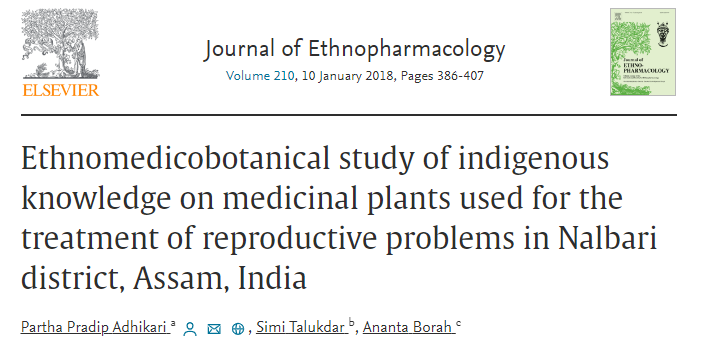Knowledge Hub
Ethnomedicinal Plants and Associated Traditional Wisdom of Garo Community of Rongram, West Garo Hills District, Meghalaya, India
2021
Author(s): Bain WK, Biswas S
The study recounts the Garo community’s traditional knowledge of medicinal plants, which they employ in some secluded enclaves of Northeast India. The study emphasizes the value of ethnobotanical research and the importance of documenting traditional wisdom related to therapeutic plant consumption.
Handloom and Handicraft Sector in India: A Review of Literature on its Demand in the Market and Availability of Original Product
2021
Author(s): Agrawal A, Chanana B
This paper reviews the status of traditional textiles, handloom, and handicrafts in India, highlighting their decline due to the popularity of low-cost synthetic materials. It emphasizes the importance of preserving traditional crafting techniques and proposes awareness campaigns and digital streaming as solutions to sustain these crafts. Mobile applications are identified as a means to increase visibility and improve customer experiences, potentially transforming these crafts into distinctive brands.

Ethno-zoological Practices by Khasis, An Indigenous Tribe of Meghalaya, India
2017
Author(s): Mihsill KRR, Keshan B
North-East India, including Meghalaya being rich in biodiversity serves as an ideal place for the sustenance of traditional medicines. The traditional method of using animal species and their products for treating various kinds of ailments was seen also many traditional healers preferred the use of plants and their products to that of animal ones due to easy availability of plants and ease of cultivation.
Meaningful Consideration? A Review of Traditional Knowledge in Environmental Decision Making
2010
Author(s): Ellis SC
This paper reviews efforts and strategies of Canada’s Northwest Territories, governments, industrial corporations, and other organizations to promote the meaningful consideration of traditional knowledge in environmental decision making.
Traditional Knowledge of Indigenous and Local Communities: International Debate and Policy Initiatives
2000
Author(s): Mauro F, Hardison PD
This paper reviews international law and policy regarding the rights of indigenous peoples and local communities that are defining the role of traditional and indigenous knowledge in the management and conservation of biodiversity.
Cultural Significance of Western Himalayan Wild Food Plants
2023
Author(s): Khan S, Masoodi TH, Pala NA, Islam MA, Raja A, Rizvi SZ
The present investigation revealed that various wild plant species are consumed as food by Himalayan communities of Kashmir valley to sustain their basic needs of life. Diverse plant parts utilized commonly were leaves, wild fruits, delicate shoots and roots. These wild food plants make significant contribution to the well-being of native communities by providing them substantial food and nutritional diets.
Indian Journal of Traditional Knowledge: A bibliometric study
2017
Author(s): Garg KC, Kumar SR
The present study provides a detailed bibliometric analysis of 1286 papers published in Indian Journal of Traditional Knowledge (IJTK) during 2002–2015. The analysis of data indicates that the flow of articles submitted to the journal has declined during the later period.
Contributions of Indigenous Knowledge to Ecological and Evolutionary Understanding
2022
Author(s): Jessen TD, Ban NC, Claxton N, Darimont CT
This study highlights how IK is increasingly incorporated in research programs, enhancing understanding of – and contributing novel insight into – ecology and evolution, as well as physiology and applied ecology (that is, management).
A Primer to Traditional Knowledge Protection in India: The Road Ahead
2021
Author(s): Chakrabarty SP, Kaur R
This paper studies shows the deliberation about indigenous peoples (of India) and their natural conservation practices through the lens of Intellectual Property Rights (IPR).

Ethno-medico Botanical Study of Indigenous Knowledge on Medicinal Plants Used For The Treatment of Reproductive Problems in Nalbari District, Assam, India.
2018
Author(s): Adhikari PP, Talukdar S, Borah A.
This documentation research work aims to explore the biological and pharmacological properties of the local name of the medicinal plants used by both male and female from indigenous knowledge for the treatment of reproductive ailments and also for confirmation and to address the class of secondary metabolites present therein.



